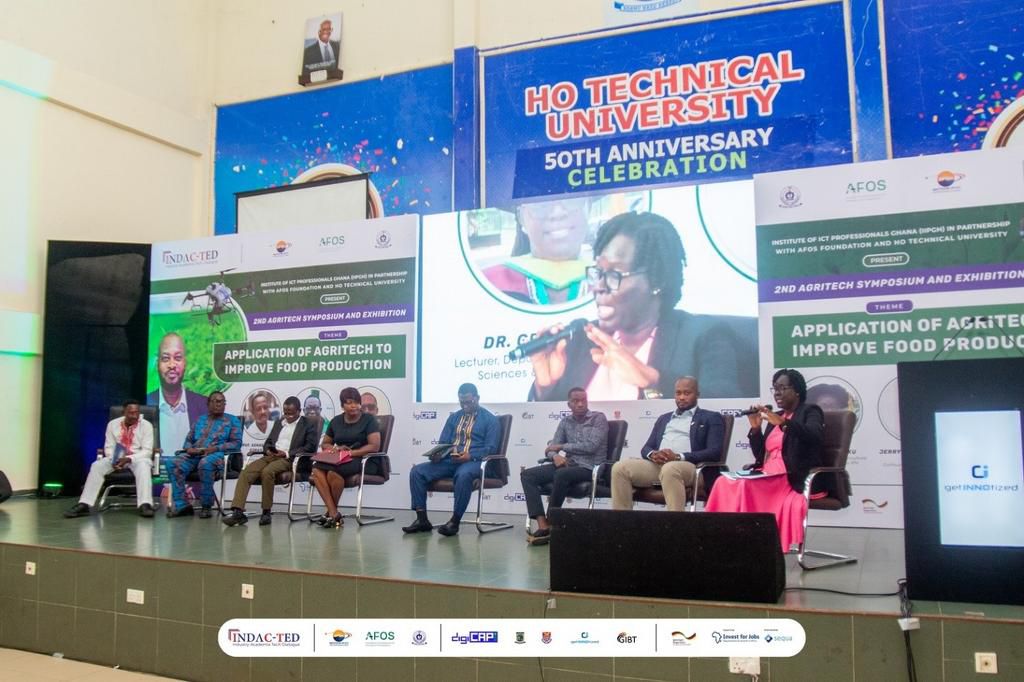Revolutionizing Agriculture: The power of Agritech as a driver for increased food production
)
The theme for this gathering, 'Application of Agritech to improve food production,' resonated deeply in a world grappling with the challenges of feeding a growing population against the backdrop of limited arable land.
Agricultural experts and technologists gathered with a common goal: to unravel the future of agriculture and the pivotal role agritech can play in ensuring food security and sufficiency.
The Vice Chancellor of Ho Technical University, Professor Ben Honyenuga, opened the symposium with a stark reality check. He lamented Ghana's dependence on other countries for much of its agricultural produce, highlighting the vulnerability this poses to the nation's food security. He stated, "The last time I watched the news, traders from the onion market were lamenting the lack of onions to sell because of turbulence in Niger, where they import these onions. We have the human resource, fertile lands, and the need to leverage the right technology to improve our agriculture rather than depending on other countries."
The Municipal Chief Executive (MCE) for the Ho Municipal Assembly, Divine Richard Komla Bosson, reinforced the importance of engaging youth in agriculture while leveraging technology to create a positive environmental impact. He stressed, "Agritech solutions utilize data analytics, sensors, and artificial intelligence to optimize agricultural practices. With the necessary skills, youth entrepreneurs can make informed decisions regarding irrigation, fertilization, and pest management. This not only maximizes yields but also minimizes resource use, reduces costs, and has a positive environmental impact."
The symposium was not only a platform for dialogue but also a practical arena where solutions were to be unearthed. David Gowu, Executive Director for the Institute of ICT Professional Ghana (IIPGH), explained that the event aligned with the Institute's vision to create a technology-driven society. He highlighted the institute's collaborative efforts with AFOS Foundation and digiCAP in fostering dialogue and collaboration between industry and academia.
Project Manager for DigiCAP.gh, Hanna Schlingmann, expressed her enthusiasm for the forum's potential to generate practical solutions.
"I feel that today's topic is particularly important because it affects all of us. I am glad that we have come together to think about and discuss how food production can be improved," she stated.
The partnership between IIPGH and AFOS Foundation is supported by the German Federal Ministry for Economic Cooperation and Development (BMZ) within the framework of the Special Initiative 'Decent Work for a Just Transition' via sequa gGmbH.
In his keynote address, Anthony Morrison, CEO of the Chamber of Agribusiness, underscored the importance of data in modern farming. He emphasized that data analytics and advanced technologies could optimize crop management, resource allocation, and supply chain logistics.
"Data is the backbone of the agricultural revolution we're witnessing today. It allows us to gain valuable insights and real-time information to improve yields, mitigate risks, and optimize resource utilization," he added.
The panel discussion that followed was equally thought-provoking. Jerry Kwaku Afenyo Denou, Co-Founder & Business Strategy Lead for Byte Africa, stressed the integration of robotics and automation as a game-changer. He explained, "With the help of robotic systems, tasks such as planting, harvesting, and monitoring crops can be performed efficiently, reducing the need for manual labor and increasing overall productivity."
Professor Ken Fafa Egbadzor, Head of the Department of Agricultural Sciences and Technology at Ho Technical University, shed light on precision agriculture. This method utilizes data analytics, remote sensing, and advanced technologies to enable farmers to make informed decisions about crop management.
"Technology now allows us to monitor soil conditions, weather patterns, and crop health in real-time. Farmers can optimize irrigation, fertilization, and pest control, resulting in higher yields and reduced environmental impact," he explained.
The panelists also highlighted the potential for further advancements in this field, including the development of autonomous vehicles and drones capable of monitoring and managing large-scale farming operations. The forum concluded with a question-and-answer session, where students and participants actively engaged with the experts.
In addition to discussions and presentations, the symposium featured an exhibition, providing participants within the agricultural value chain a platform to showcase their products and services.

It also facilitated networking opportunities, fostering connections among experts and stakeholders in the agriculture and technology sectors.
As the symposium and exhibition drew to a close, it became evident that the marriage of agriculture and technology, as epitomized by agritech, holds the key to overcoming the challenges of food production in a world marked by population growth and limited arable land.
In the quest for sustainable, efficient, and environmentally friendly farming practices, Ghana's agricultural landscape is poised for a transformation driven by innovation and technology.
)
)
)
)
)